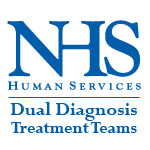DDTT Programs Receive Service Innovation Award
 NHS Dual Diagnosis Treatment Teams (DDTT) has expanded over the last year, and was also recognized in 2013 by the Rehabilitation and Community Providers Association (RCPA) with the RCPA Service Innovation Award for significant innovation in the area of cross-systems integration. The DDTT program is a voluntary continuum of care service delivery model that addresses not only the clinical needs during crises, but also during periods of transition back into the community for individuals with dual diagnoses (I/DD and Mental Health). The model places an extensive focus on crisis intervention, and stabilization while in the community. It can also be effectively utilized to support this population during reintegration back into the community upon discharge from acute inpatient units, state hospitals, state centers and particularly the Community Stabilization and Reintegration Unit (CSRU).
NHS Dual Diagnosis Treatment Teams (DDTT) has expanded over the last year, and was also recognized in 2013 by the Rehabilitation and Community Providers Association (RCPA) with the RCPA Service Innovation Award for significant innovation in the area of cross-systems integration. The DDTT program is a voluntary continuum of care service delivery model that addresses not only the clinical needs during crises, but also during periods of transition back into the community for individuals with dual diagnoses (I/DD and Mental Health). The model places an extensive focus on crisis intervention, and stabilization while in the community. It can also be effectively utilized to support this population during reintegration back into the community upon discharge from acute inpatient units, state hospitals, state centers and particularly the Community Stabilization and Reintegration Unit (CSRU).Since 2012, the NHS DDTT program has assisted individuals with MH/IDD, who historically have been an extremely costly group for the government and payers due to placement in higher levels of care, to remain living in the community during acute episodes of crisis. The number of emergency room visits and inpatient admissions as a result of psychiatric crises/emergencies has decreased from an average of 38 visits to less than 10 in a 6-month period. This decrease was a result of the teams providing other community resources to individuals as opposed to going into the hospital. In addition, consumer satisfaction surveys have shown that the majority of individuals are very satisfied with services, and positive feedback has been received about the NHS DDTT program from leading psychiatrists and crisis services in the areas served.
The NHS DDTT program continues to strive for excellence in quality of service delivery, and has been recognized by counties and medical professionals that they serve and partner with as being a valuable, crucial, and cost-savings resource for individuals with dual diagnoses.
